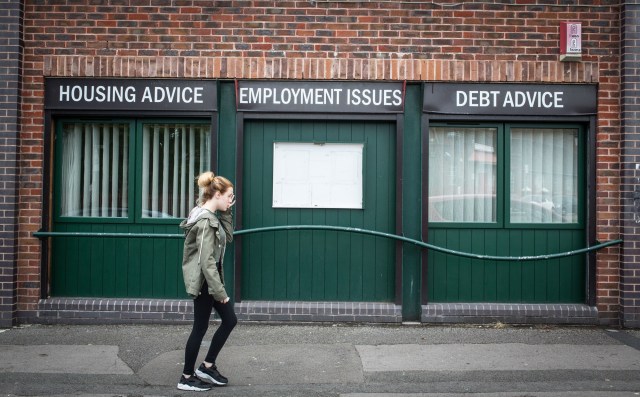Credit: Matt Cardy/Getty Images
How would you feel if I added £500 to your bills, in fact, let’s say £800? That’s an additional £67 a month. I imagine for many UnHerd readers that’s an irritation, not necessarily easily subsumed into the monthly budget, but not exactly a disaster.
Now imagine you’re struggling to make ends meet, earning the National Living Wage; and the hours you work fluctuate week to week, making it near impossible to plan; and you have no savings at all to fall back on, which is particularly difficult because your Universal Credit benefit top-up isn’t always accurate. Oh, and because of all that, you had to borrow money from a payday lender to fix the washing machine that broke suddenly. That £67 now sounds huge; insurmountable even.
Yet that is the situation for millions of families in the UK who, by virtue of living on low incomes, are paying a ‘poverty premium’ – a higher cost for essential goods and services. Research by the University of Bristol found that in 2016, the average low-income household paid a premium of £490, while one in ten paid at least £780.[1. Sara Davies and Andrea Finney, Making the poverty premium history, Personal Finance Research Centre, University of Bristol, November 2017] For someone living on low, often unpredictable income, that additional cost could mean the difference between just about managing, and not managing at all.
Last week the Social Market Foundation, a London think tank, and non-profit Joseph Rowntree Foundation held a conference to explore how markets can be made fairer for disadvantaged households – how they can tackle the poverty premium.
The Bristol University study argues that:
“At its core, the poverty premium represents a mismatch between the needs and circumstances of low-income households and the markets that serve them.”
On the face of it, that might sound counter-intuitive: markets, as Adam Smith long ago argued, are dynamic; consumers and produces create a mutually-beneficial relationship that delivers prosperity for both. How, then, do you end up with such a mismatch? Because, crucially, that’s just part of Smith’s argument. The 18th century economist and philosopher recognised that self-interest was not, in fact, sufficient for a functioning society. And that monopolistic tendencies undermine the key ingredient of the free-market model he advocated: competition.
Looking at the major consumer markets today, Adam Smith would not recognise a free market system, he would see oligopolies, markets captured by the big boys whose producer self-interest had been allowed to trump that of their consumers. Which brings us back to the poverty premium.
The biggest drivers of the poverty premium are energy costs, insurance premiums and access to credit.
As we all know, to get the best deals you need to be able to commit to longer contracts and pay by direct debit. And that, of course, is something many low-income families can’t do. That’s why, when it comes to energy, a third still have pre-payment metres. And, to avoid the ‘loyalty premium’, you need to be a frequent switcher – which is easier said than done if you don’t have internet access, or suffer from poor mental health or illiteracy (more than five million adults in England are ‘functionally illiterate’). Add to that a lack of meaningful competition – the sort that would disrupt markets that are failing particular customer groups – and it becomes clear that a shake-up is needed.

Take the energy industry, which is dominated by the “Big Six”. In 2014 Ofgem, the energy regulator, was so worried about market failure that it referred the sector to the Competition and Markets Authority (CMA). The CMA reported that the six firms supplied energy to more than 90% of domestic customers, and that 70% of those customers were still on expensive ‘default’ standard variable tariffs – i.e. they were getting a bad deal.
Over 30 reforms came out of their investigation, all aimed at increasing competition and protecting consumers. Which is exactly what an effective regulatory framework should do. Only this week, Ofgem announced it is testing “collective” switching for consumers on the worst deals, and is trailing digital products to help others. At the extreme end, last year the regulator introduced a “safeguard tariff” – a price cap – for prepayment meters.
There are promising signs that the steps taken are starting to bear fruit: the market share of the Big Six has dropped to 80%, still pretty concentrated, but going in the right direction. Between the third quarter of 2016 and the third quarter of 2017, the number of suppliers increased from 48 to 66 – an almost 40% rise.[2. ‘Retail market indicators’, Ofgem, accessed 13 February 2018] Jade Kirk, Head of Customer Service at new supplier Robin Hood Energy, a non-profit launched by Nottingham City Council, told conference delegates that they hadn’t been affected by the prepayment cap, because they already had lower prices. Tackling fuel poverty is the company’s raison d’etre, and they see competition as central to that – “It’s time to say goodbye Big Six, hello smaller bills”, quips their website.
That’s what regulators should be doing – acting in the interests of the consumer to make markets fairer by boosting competition. It means fighting the oligopolies we’ve allowed to develop – research by the Social Market Foundation published late last year found, shockingly, that eight out of ten consumer markets were “concentrated”, not competitive.[3. Scott Corfe and Nicole Gicheva, Concentration not competition: the state of UK consumer markets, Social Market Foundation, October 2017] Adam Smith would not approve.
But while there is clearly scope for regulators to do more, markets are not instruments of social policy, and nor should they be. Which is why tackling the poverty premium must be about more than regulatory intervention.
Take the insurance sector. Compounding the higher pay-monthly costs of insurance are the higher premiums charged for living in a high-risk area – the average area-based premiums account for 17% of the poverty premium.[3. Sara Davies, Andrea Finney and Yvette Hartfree, Paying to be poor. Uncovering the scale and nature of the poverty premium, November 2016] “I’m very sorry that you are living in a run-down, high-crime neighbourhood, but that’s going to cost you extra”. Which seems unfair, but, from a market perspective, it’s logical – higher risk, higher price. Yes, companies should ‘do good’ in the communities they operate in, but they are profit-making businesses, not an arm of the welfare state. They are not a substitute for a social security system that genuinely supports the poorest; an education sector that prepares young people for the future world of work; a skills strategy that enables people to progress and shift careers; an industrial strategy that supports job creation. That, as Adam Smith recognised, is the job of government.
Even if everyone practiced Smith’s enlightened self-interest, markets would still need muscular regulators, fighting for ordinary consumers, and government would still need to deliver good schools and employment support and a benefit system that works. Competition is essential to driving down prices; social policy can ensure they are affordable for all.









Join the discussion
Join like minded readers that support our journalism by becoming a paid subscriber
To join the discussion in the comments, become a paid subscriber.
Join like minded readers that support our journalism, read unlimited articles and enjoy other subscriber-only benefits.
Subscribe